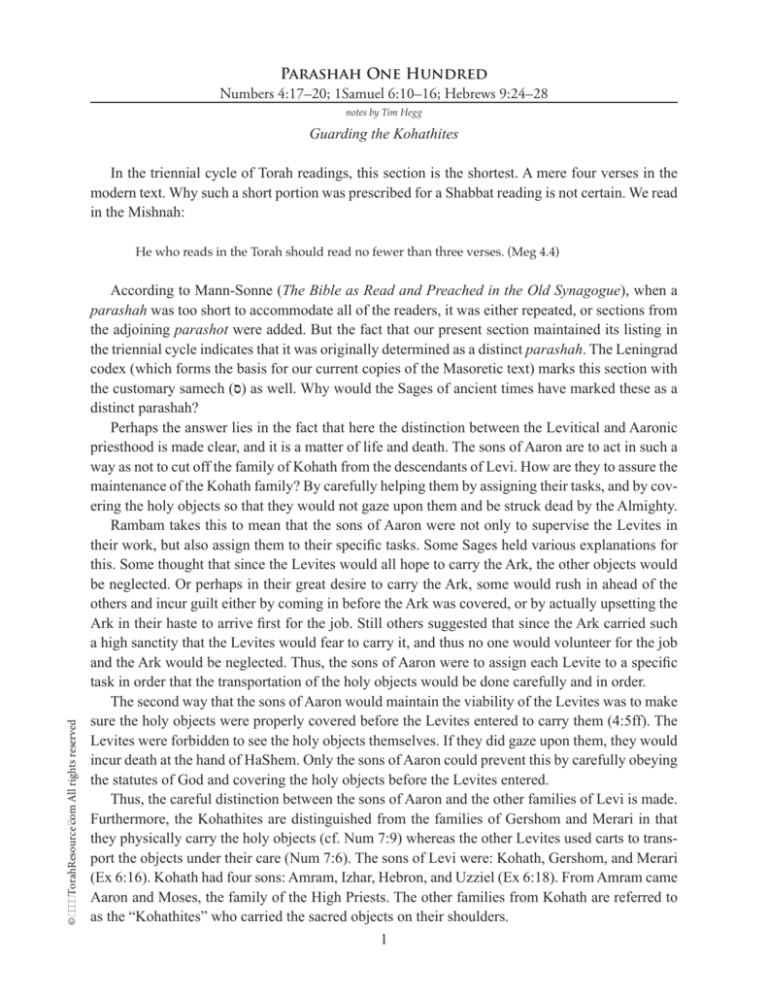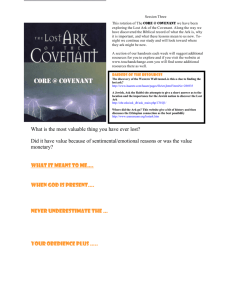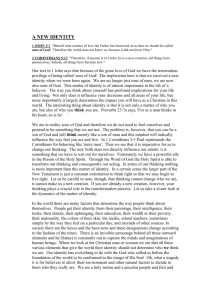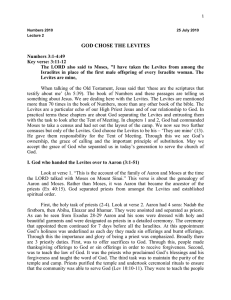
Parashah One Hundred
Numbers 4:17–20; 1Samuel 6:10–16; Hebrews 9:24–28
notes by Tim Hegg
Guarding the Kohathites
In the triennial cycle of Torah readings, this section is the shortest. A mere four verses in the
modern text. Why such a short portion was pre­scribed for a Shabbat reading is not certain. We read
in the Mishnah:
©2005 TorahResource.com All rights reserved
He who reads in the Torah should read no fewer than three verses. (Meg 4.4)
According to Mann-Sonne (The Bible as Read and Preached in the Old Synagogue), when a
parashah was too short to accommodate all of the readers, it was either repeated, or sections from
the adjoining parashot were added. But the fact that our present section maintained its listing in
the triennial cycle indicates that it was originally determined as a distinct parashah. The Leningrad
codex (which forms the basis for our current copies of the Masoretic text) marks this section with
the customary samech ( )סas well. Why would the Sages of ancient times have marked these as a
dis­tinct parashah?
Perhaps the answer lies in the fact that here the distinction between the Levitical and Aaronic
priesthood is made clear, and it is a matter of life and death. The sons of Aaron are to act in such a
way as not to cut off the family of Kohath from the descendants of Levi. How are they to assure the
maintenance of the Kohath family? By carefully helping them by assigning their tasks, and by covering the holy objects so that they would not gaze upon them and be struck dead by the Almighty.
Rambam takes this to mean that the sons of Aaron were not only to supervise the Levites in
their work, but also assign them to their specific tasks. Some Sages held various explanations for
this. Some thought that since the Levites would all hope to carry the Ark, the other objects would
be neglected. Or perhaps in their great desire to carry the Ark, some would rush in ahead of the
others and incur guilt either by coming in before the Ark was covered, or by actually upsetting the
Ark in their haste to arrive first for the job. Still others suggested that since the Ark carried such
a high sanc­tity that the Levites would fear to carry it, and thus no one would volunteer for the job
and the Ark would be neglected. Thus, the sons of Aaron were to assign each Levite to a specific
task in order that the trans­por­tation of the holy objects would be done carefully and in order.
The second way that the sons of Aaron would maintain the viability of the Levites was to make
sure the holy objects were properly covered before the Levites entered to carry them (4:5ff). The
Levites were for­bidden to see the holy objects themselves. If they did gaze upon them, they would
incur death at the hand of HaShem. Only the sons of Aaron could prevent this by carefully obeying
the statutes of God and covering the holy objects before the Levites entered.
Thus, the careful distinction between the sons of Aaron and the other families of Levi is made.
Furthermore, the Kohathites are distinguished from the families of Gershom and Merari in that
they physically carry the holy ob­jects (cf. Num 7:9) whereas the other Levites used carts to transport the objects under their care (Num 7:6). The sons of Levi were: Kohath, Gershom, and Merari
(Ex 6:16). Kohath had four sons: Amram, Izhar, Hebron, and Uzziel (Ex 6:18). From Amram came
Aaron and Moses, the family of the High Priests. The other families from Kohath are referred to
as the “Kohathites” who carried the sacred objects on their shoulders.
1
©2005 TorahResource.com All rights reserved
Here, once again, the lesson one learns is that God is a God Who makes a distinction—Who,
according to His own sovereign choosing assigns to each according to His will. It is in our sinful
nature to question the sov­er­eign choosing which God ordains. This was the sin of Korach (Num
16). Korach was the son of Izhar, the son of Kohath. Korach questioned why Moses and Aaron
had the privilege of entering into the Tabernacle and ministering before the Lord with the sacred
object. He questioned God’s choice and rebelled against Moses and Aaron, wanting to share in the
holy service of the Tabernacle. It is not as though Korach’s desire was in itself ungodly—surely
the desire to minister in the very presence of God (in this case, within the Holy Place and Most
Holy Place) is a right­eous one. But here is where a vital lesson is learned: if our desires are to be
genuinely righteous, they must conform to God’s plan and not to our own. Even the “good” can be
evil if done contrary to God’s will.
As we shall see when we study Numbers 16, the heart of Korach’s sin was that of rebellion. In
the first place it was rebellion against the lead­ership of Moses and Aaron. But in the final analysis
it was rebellion against God Himself, for God was the One who sovereignly appointed Aaron and
Moses. As such, rebellion against God is met with severe punishment, for rebellion against God
is the sin of idolatry. Accepting God as the One and only God is first and foremost demonstrated
by our willingness to obey Him. Blatantly to fly in the face of God by rebelliously disregarding
His commandments is the same as denying His sovereign, unique position in the universe. Thus,
our portion this Shabbat, though short, makes it very clear that the sons of Aaron were chosen by
God for a unique service, and that any who would attempt to usurp this divinely ordained position
would be punished as rebels—they would be put to death.
A second emphasis given in our parashah is the utter sanctity of God’s holiness. For we understand from the text that even inadvertent im­pro­pri­ety in the matter of the sacred objects could
result in death. Even apart from willful rebellion, demonstrated by Korach in the subsequent story,
the penalty for seeing the holy objects was likewise death. Like the story of Uzzah who reached
out to steady the Ark from falling and lost his life, so this passage is misapplied by some to paint
the God of Israel as harsh and un­loving. Why should the sons of Kohath be punished if the sons of
Aaron neglect their duties and fail to cover the holy objects as instructed? Why should they incur
guilt for the neglect of others?
But to focus on the issue from this angle is to miss the important lesson the text wishes to teach.
The emphasis is not only upon the duties of each group but also upon the utter holiness of God.
What we are to learn from this passage is that God is holy and nothing, not even the mis­haps of
mankind nor good intentions, can diminish this holiness. The un­yielding standard of God’s holiness is His own unchangeable character. This is why atonement by good deeds is not only a fallacy but a biblical impossibility. God’s holiness, which is foundational for His justice, cannot be
diminished even by mankind’s noblest attempts to prove to the Al­mighty that he is sorry and wants
to make amends. Sin, by its very nature, seeks to diminish the holiness of God, and that cannot be.
God’s holiness is a con­suming fire that cannot be quenched. He must be satisfied or He will utterly
consume that which is contrary to Him. And He will only be sat­isfied by holiness that matches His
own. In fact, it is the Deceiver’s lie from the beginning that somehow mankind can bring himself
to the level of God, matching His divine greatness and holiness. And fallen man continues to believe that lie—that somehow, some way, the all loving and merciful God will act outside of His
own holiness and disregard the requirement that sin be punished. But He cannot—He will not, for
upholding justice (in which payment for sin is required) is as much the display of His divine nature
2
©2005 TorahResource.com All rights reserved
as is His willingness to forgive and show mercy. Neither can be diminished, nor should we hope
that either should be diminished. For if God can act outside of His character, He ceases to be the
true God of the Bible.
Even as God sovereignly chose Aaron to be His High Priest, and the other families of Levi to
assist him in his duties, so God apportions to each as He wills, and brings about His holy purposes
for all of His creation. A willing submission to His will is the inevitable response of all who are
born from above.
But our haftarah portion brings up another aspect of God’s sovereign choice: He gives His
commandments to His chosen ones. The Philistines, in capturing the Ark, discovered that the God
of Israel could defend Him­self regardless of the location of the sacred object. Realizing that its
presence in their god’s temple was a disaster rather than a victory, they attempted to return the Ark
to Israel, and did it in their own pagan way. They had both handled and seen the Ark, opened its
top and placed their pagan idols into it. Yet they are not destroyed. Even their inventive methods of
transporting the Ark are used by God to bring it back to Israel. Yet in a similar story, when David
attempts to move the Ark into Jerusalem, even the well-intentioned, in­stinctive attempts by Uzzah
to protect the Ark are met with severe, divine ret­ri­bution. Why? The answer is obvious: God gives
His commandments to His cho­sen ones, and in giving them, He requires of His people an obedience to the commandments. The Philistines were not His chosen people. Whom the Father loves
He chastens.
Our Apostolic section brings this lesson full circle. The whole picture of the Tabernacle, priesthood, sacrifices, and divine service point to the ultimate priestly work of Yeshua. Even as Aaron
was chosen to be the one who came in before the Lord, so Yeshua is the Chosen of God, the only
One able to effect the atonement necessary for the washing away of our guilt. No one can take His
place, and any attempts to do so will be met with the consuming fire of God’s holiness. “He who
believes in the Son has eternal life; but he who does not obey the Son will not see life, but the wrath
of God abides on him.” John 3:36
3







